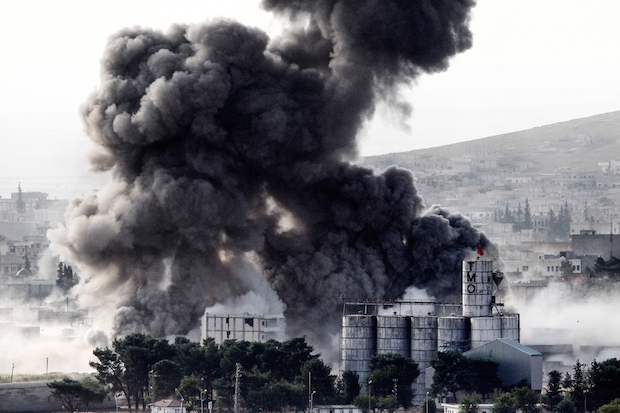David Cameron may now have his bombing mandate, but he still has no strategy. The PM’s ‘hope for the best’ rhetoric yesterday was distinctly un-Churchillian: ‘I know that will take a long time and that it will be complex,’ he said, ‘but that is the strategy, and we need to start with the first step, which is going after these terrorists today.’
It is not much of a plan, and those in the know know it: from defence chiefs – some of them friends of mine – giving anonymous briefings, to Parliament’s own foreign affairs committee, and even the voters, whom polls show swinging ever further away from air strikes.
They are right to be sceptical. The vagueness of the plans was shown in the references to Iraq. Cameron was right to say that British jets can perform a unique function: the Brimstone missile is indeed a precision weapon other allies, Saudi Arabia excepted, do not possess. But Crispin Blunt put his foot in his mouth when he said that our presence ‘has stabilised Iraq’. Stabilised? I have been there, and the truth is that Iraq is fighting a straight-up fight against the ‘death cult’, and is not winning.
The debate raised far more questions than Cameron and his supporters could answer. Even before MPs began to unpick the seams of the plan, Cameron had to admit that the 70,000 ‘friendly’ rebels might not be an effective fighting force. But there are even bigger unanswered questions – above all, about Turkey, Russia and the many players in the Middle East.
Transition to democracy and the removal of Assad was already unlikely: four years of talks have failed to get even the 50-plus rebel groupings to agree with each other on the way forward. Now, with Russia’s arrival in strength, the idea of democratically replacing Assad is off the table. The much-heralded Vienna discussions to resolve an Assad transition will, I suspect, collapse very soon. So will we be working with or against Russia? Cameron gave no answer.
Nor did he elaborate on the 800-pound gorilla in the room: Turkey. ISIS derives most of its income by oil shipped in hundreds of road tankers across the border, while ammunition, cash, fighters, and even drugs from across the world flow between the two countries. The taxpayer could save a fortune by forgetting the Brimstone missiles and deploying soldiers on that border to shoot the newly arriving jihadists.
Behind the scenes, foreign office officials mutter about how Turkey’s position is precarious enough already. Its Muslim Brotherhood government has just escaped near defeat in elections; awash with refugees, it knows that cutting the oil and arms and volunteers pipeline invites ISIS attack on its own soil as well.
In turn, Turkey is only one of a myriad of players, from Gulf autocracies, whom the British government is clearly afraid to offend, to an alphabet soup of competing terrorist and nationalist factions from the Persian Gulf states and MENA region; ISIS is special only because it, along with Al-Qa’eda, is ready to indiscriminately bomb western cities.
But in the chaos that would follow its defeat, other equally nasty groups might well pop up. Labour’s Gisela Stuart made an unanswerable point:
‘Ground troops that we can work with will be absolutely essential for his [the PM’s] long-term strategy. At the moment he has not shown to me that as we defeat ISIS, we will not simply create a vacuum into which Assad or someone else will move and we will be fighting another enemy.’
Members of the defence community, on both sides of the Atlantic, have been muttering much the same thing all week: that bombing, without ground troops, will never deliver victory, as endless Middle East adventures have shown. And even the Iraq invasion, which involved 120,000 boots on the ground, ended up eventually in chaos – which led to the rise of international terrorism.
It has become clear that the only reason to get involved is that everyone else is. In the first Gulf War, this thinking worked magnificently. In the second Gulf War, Afghanistan and Libya, it brought only pain.
Here’s an alternative proposal. Do a deal with Turkey before Russia retaliates against them. Get Turkey’s agreement to close their border with Syria. Instead of bombing towns and villages, bomb the easily-seen oil truck convoys heading for Turkey. Cut ISIS’s funding sources: that will bleed them to death.
Richard Galustian is a defence and security contractor, based most recently in Libya.






Comments